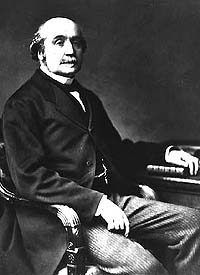- Albert, 4th duc de Broglie
Infobox Prime Minister
name=Albert, duc de Broglie
order=34thPrime Minister of France
term_start =25 May 1873
term_end =22 May 1874
predecessor =Jules Dufaure
successor =Ernest Courtot de Cissey
order2=39thPrime Minister of France
term_start2 =17 May 1877
term_end2 =23 November 1877
predecessor2 =Jules Simon
successor2 =Gaëtan de Rochebouët
birth_date =13 June 1821
death_date =death date and age|1901|1|19|1821|6|13|
party=NoneJacques-Victor-Albert, 4th duc de Broglie (13 June 1821ndash 19 January 1901), was a French
monarchist politician..The third child and eldest son of
Victor, 3rd duc de Broglie , a notable liberalDeuce of theJuly Monarchy , he was born inParis . On 18 June 1845, he marriedPauline de Galard de Brassac de Béarn (1825ndash 1860) in a Paris.
* Louis-Alphonse-Victor, 5th duc de Broglie (1846ndash 1906) father of the scientist brothers including the Nobel Laureate.
* Maurice (1848ndash 1862)
* Henri-Amédée (1849ndash 1917)
* François-Marie-Albert (1851ndash 1939) great-grandfather of the present duc,Victor-François, 8th duc de Broglie (b. 1949).
* César-Paul-Emmanuel (1854ndash 1926)He died in Paris on 19 January 1901, aged 79.
Career
After a brief diplomatic career at
Madrid andRome , the revolution of 1848 caused Albert de Broglie to withdraw from public life and devote himself toliterature . He had already published a translation of the religious system of Leibniz (1846). He now at once made his mark by his contributions to the "Revue des deux mondes " and theOrleanist and clerical organ " _fr. Le Correspondant". These, and other contributions, brought him the succession to Lacordaire's seat in theAcadémie française in 1862, joining his father in this august society.In 1870 he succeeded his father as
duc de Broglie , having previously been known as the "prince de Broglie". In the following year he was elected to the National Assembly for the "département" of theEure , and a few days later (on 19 February) was appointed ambassador inLondon .In March 1872, however, in consequence of criticisms of his negotiations concerning the commercial treaties between Britain and France, he resigned his post and took his seat in the Assembly, where he became the leading spirit of the monarchical campaign against President Thiers.
On the replacement of the latter by Marshal Mac-Mahon, the duc de Broglie became President of the Council and Minister for Foreign Affairs (May 1873), but in the reconstruction of the ministry on 26 November, after the passing of the septennate, transferred himself to become the Minister of the Interior. His tenure of office was marked by an extreme conservatism, which roused the bitter hatred of the Republicans, while he alienated the
Legitimist party by his friendly relations with the Bonapartists, and the Bonapartists by an attempt to effect a compromise between the rival claimants to the monarchy.The result was the fall of the cabinet on 16 May 1874. Three years later (on 16 May 1877) he was entrusted with the formation of a new cabinet, with the object of appealing to the country and securing a new chamber more favorable to the reactionaries than its predecessor had been. The result, however, was a decisive Republican majority. The duc de Broglie was defeated in his own district, and resigned office on 20 November. Defeated in 1885, he abandoned politics and reverted to his historical work, publishing a series of historical studies and biographies.
Works
Besides editing the "Souvenirs" of his father (1886, etc.), the "Mémoires of Talleyrand" (1891, etc.), and the "Letters of the Duchess Albertine de Broglie" (1896), he published " _fr. Le Secret du roi, Correspondance secrète de Louis XV avec ses agents diplomatiques, 1752-1774" (1878); "Frédéric II et Marie Thérèse" (1883); "Frédéric II et Louis XV" (1885); "Marie Thérèse Impératrice" (1888); "Le Père Lacordaire" (1889); "Maurice de Saxe et le marquis d'Argenson" (1891); "La Paix d'Aix-la-Chapelle" (1892); "L'Alliance autrichienne" (1895); "La Mission de M. de Gontaut-Biron à Berlin" (1896); "Voltaire avant et pendant la Guerre de Sept Ans" (1898); "Saint Ambroise", translated by
Margaret Maitland in the series of The Saints (1899).Ministries
1st Ministry (25 Mayndash 26 November 1873)
*Duc de Broglie - President of the Council and Minister of Foreign Affairs
*François Claude du Barail - Minister of War
*Charles Beulé - Minister of the Interior
*Pierre Magne - Minister of Finance
*Jean Ernoul - Minister of Justice
*Charles Dompierre d'Hormoy - Minister of Marine and Colonies
*Anselme de Batbie - Minister of Public Instruction, Fine Arts, and Worship
*Alfred Deseilligny - Minister of Public Works
*Joseph de la Bouillerie - Minister of Agriculture and Commerce2nd Ministry (26 November 1873ndash 22 May 1874)
*Duc de Broglie - President of the Council and Minister of the Interior
*Louis Decazes - Minister of Foreign Affairs
*François Claude du Barail - Minister of War
*Pierre Magne - Minister of Finance
*Octave Depeyre - Minister of Justice
*Charles Dompierre d'Hormoy - Minister of Marine and Colonies
*Oscar Bardi de Fourtou - Minister of Public Instruction, Fine Arts, and Worship
*Charles de Larcy - Minister of Public Works
*Alfred Deseilligny - Minister of Agriculture and Commerce3rd Ministry (17 Mayndash 23 November 1877)
*Duc de Broglie - President of the Council and Minister of Justice
*Louis Decazes - Minister of Foreign Affairs
*Jean Auguste Berthaud - Minister of War
*Oscar Bardi de Fourtou - Minister of the Interior
*Eugène Caillaux - Minister of Finance
*Albert Gicquel des Touches - Minister of Marine and Colonies
*Joseph Brunet - Minister of Public Instruction, Fine Arts, and Worship
*Auguste Pâris - Minister of Public Works
*Vicomte de Meaux - Minister of Agriculture and CommerceReferences
*
External links
*fr icon [http://www.academie-francaise.fr/immortels/base/academiciens/fiche.asp?param=409 Les Immortels: Albert de BROGLIE]
Wikimedia Foundation. 2010.
